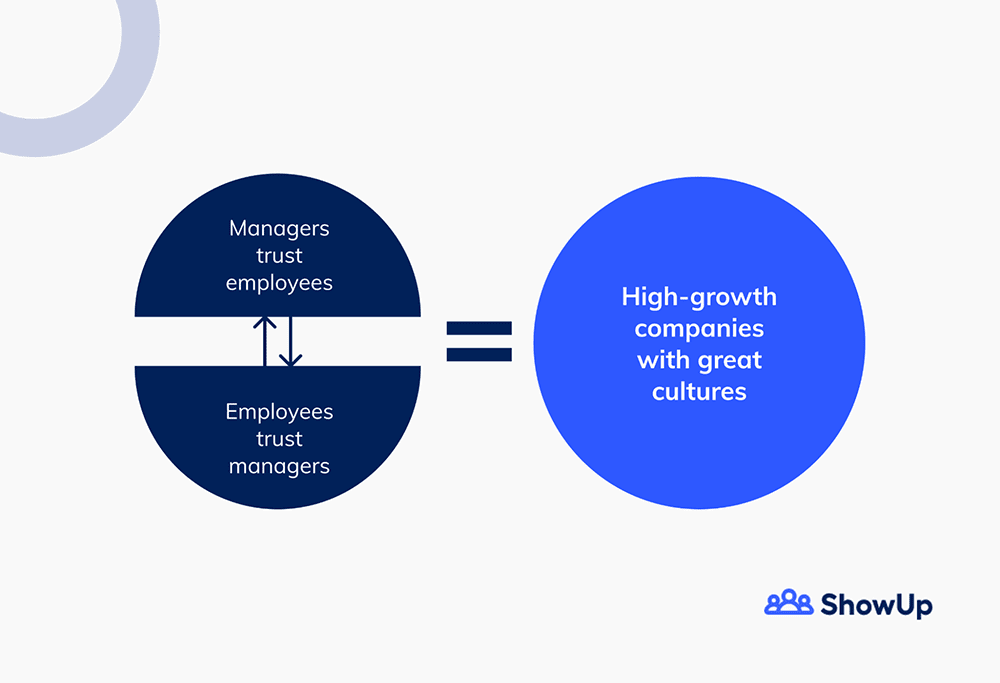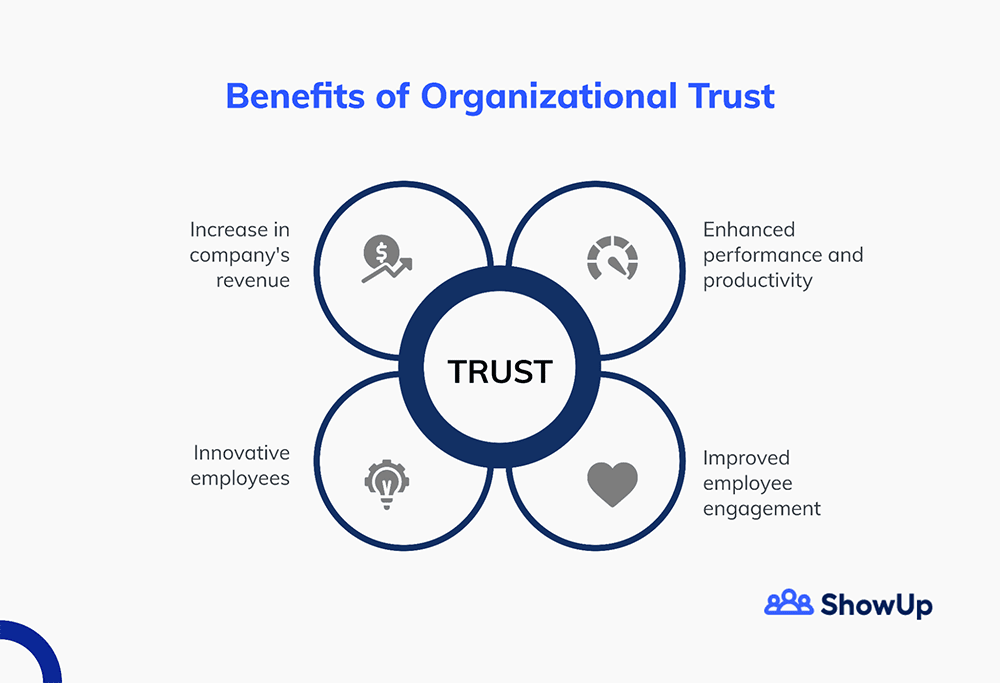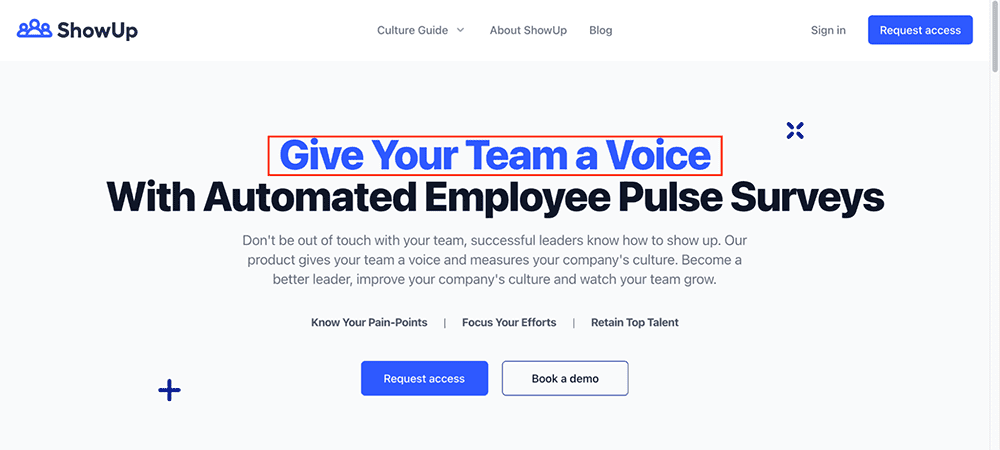Get inspired to build trust in your organization with these 5 Ted talks on trust
In 1748, Benjamin Franklin, one of the founding fathers of the US wrote: “Remember that time is money.” From there on, the phrase caught fire.
It’s now used by employers, coaches, managers, parents, etc. to point out the repercussions of laziness or idleness. In fact, it’s likely as a manager, when your employee is wasting time and delaying a project, you’ve uttered the words:
“Time is money! The company is losing money by the second the longer you waste time. So hurry up and complete this task!”
Sounds familiar?
Anyway, we can agree time is indeed money.
But do you know Trust is also money?.
You see, a company that lacks trust will suffer and bleed money. And there are studies proving this connection.
For example, far back in 2001, Paul Zak, Professor of Neuromanagement, and Stephen Knack, Lead Economist developed a general equilibrium growth model. This model showed the relationship between trust and economic performance.
They found out low trust environments reduce the rate of financial investments.
Since then, it’s become a top priority for managers to cultivate a high-trust working environment. And by a high trust environment, I mean an environment where employees trust their managers and vice versa.
In short, a study by SHRM revealed 61% of respondents agreed trust between employees and senior management was a major contributor to their overall job satisfaction.
Mind-blowing right?
Trust is an integral part of every great company.
There must be trust between managers and employees i.e as a manager, you have to trust in the ability of your staff, and know they’ll do their jobs. On the other hand, your staff has to trust you to have their best interest at heart. This is what leads to high-growth companies with great cultures:

Warren Buffett once said,
Trust is like the air we breathe. When it is present, nobody really notices. But when it’s absent, everybody notices.
A company lacking in trust will leave disengaged, disgruntled, and dissatisfied employees in its wake. For practical and effective information on how to build trust and retain top talent in your organization, check out this piece.
But if you are looking for inspiration and knowledge to get you started, you’re on the right page.
Because in this article, I’ll introduce you to a few TED talks which are a good source of inspiration for any proactive manager looking to make a positive impact and increase organizational trust. Alongside, I’ll show you how team pulse surveys help in trust-building.
Build your organizational trust with pulse surveys
Table of Contents:
Benefits of Management-Employee Trust in the workplace
Earlier on, I mentioned an increase in organizational revenue as a major benefit of a high-trust workplace. But there are other benefits of cultivating a culture of trust, among which are:

Enhanced Performance and Productivity
One great effect of high organizational trust is the enhancement of the performance and productivity of your employees.
To prove this, Paul Zak, the Neuroscientist cited before, conducted another research. He then found out when compared with people at low-trust companies, those at high-trust companies were 50% more productive. They also had 106% more energy at work and were 40% less likely to experience burnout.
It is easy to see the correlation between trust and an increase in employee performance.
You see, humans like to go above and beyond for who or what they believe in. So, if your team members trust you, they’ll buy into the vision of the company, and ensure they bring it to life.
To further cement this point, the words of Ayeshah Johnson, Workplace Strategist, and Senior Director of Diversity and Inclusion at Goulston & Storrs
come to mind:
Trust is the glue that holds together high-performing teams and organizations, and it brings out the best in employees. When employees feel trust, they are willing to give more energy towards their own motivation and to the motivation and vision of others.
Innovation
Every manager and leader dreams of the day when his/her employees will make groundbreaking discoveries.
After all, game-changing innovations are a competitive advantage in any industry.
Yet, without trust, chances your employees will birth cutting-edge innovations are slim. The best innovations happen in environments where there is mutual trust and understanding.
As John Hall the Co-founder and President of Calendar, and Strategic Adviser for Relevance, said:
Each of your employees has unique strengths. When you establish an atmosphere of trust with and among your employees, talented individuals can use those strengths to collaborate and innovate to your company’s benefit.
In other words, companies with high levels of trust have collaborative employees with passion instilled in their workplace.
Employee Engagement
Another side benefit of fostering an environment of mutual organizational trust is the improvement in employee engagement.
Simply put, trust is a driver of employee engagement. And as you may already be aware, employee engagement is important for managers seeking growth.
I like the way Stephanie Stewart, Senior People Operations Manager at Harvest put it:
If employees feel trusted, they feel more engaged. Nobody likes to be micromanaged.
A micromanager boss doesn’t inspire trust and engagement in workers.
Paul Zak’s research also revealed employees experienced 76% more engagement, and 29% more satisfaction in high-trust companies.
Are you now completely sold on the idea of developing trust in your company?
Then, as promised, let’s look at some TED talks explaining more about the process of trust.
5 TED Talks On Organizational Trust
TED conferences are generally a good source of knowledge and inspiration and this is why they are so popular. So, I’ve put together 5 great TED talks by some industry experts on trust.
If you’d like to watch any of the talks, click on the videos below.
However, if you don’t have a few minutes per video to spare, I’ve got you. I’ve included the takeaway points from each video. The points I highlight are enough to give you a good idea of what the talks are about.
Let’s get right into it.
Workplace Trust And Transparency by Ben Hempstead
"Let’s talk about trust. I think we should enjoy more of it” were the first words out of Ben’s lips.
Ben Hempstead is the Chief of Staff and Lead Mechanical Engineer at Electroimpact. In this talk, he described his experiences working in a company that prioritizes trust and transparency.
Takeaway points from Ben Hempstead’s talk on organizational trust and transparency
In the 5+ minute talk, Ben spoke about a few scenarios on how the management of the firm implements trust. He also spoke about how important trust is to the company. Some of the points he made are:
- Each employee contributes a part to the overall system of the company.
- Trust and transparency are keys to success.
- Trust begins at hiring.
- Employees have vertical responsibilities for their work. Rather than a mile-wide, and inch-deep responsibility, each employee has end-to-end autonomy and responsibilities for their part.
- Connect, don’t isolate.
- Turnover is quite low in his company because of their efforts in building mutual trust.
First Why And Then Trust by Simon Sinek
What exactly is trust? You might wonder?
In this talk, Best Selling Author and Unshakable Optimist Simon Sinek said:
Trust is a feeling. A distinctly human experience. Trust is human. It’s about human interaction, It’s about real conversations (with your employees).
Simon went deep on why trust is king in our communities and companies. He also spoke about how company cultures have evolved and how trust plays a vital role in evolution.
Takeaway points from Simon Sinek’s talk on trust
In Simon’s words,
The reason trust is important is because when we are surrounded by people who believe what we believe, we’re more confident to take risks and experiment.
He then described the phenomenon of ‘Split’ happening in organizations.
The split is the biggest challenge a company will ever face. It happens when the company grows, stress goes up, but passion and purpose declines.
How does the ‘Split’ relate to organizational trust?
Simon Sinek explained how:
In organizations that are going through a split, distrust increases. We (employees) become distrustful of each other inside our own organizations, we become distrustful of management.
Therefore, Simon recommends managers should have more handshake discussions and debate leadership to manage the problem of the ‘split’.
What We Don’t Understand about trust by Onora O'Neill
Onora O'Neill is a British Philosopher who has some interesting views on trust. According to her, the standard views (or cliches if you will) people have about trust are:
- A Claim: There has been a great decline in trust
- An Aim: We should have more trust
- A Task: We should rebuild trust
But, Onora thinks all three views are misconceived, and in this video, gives a story on a better purchase of the matter of the trust (Claim, aim, and task).
Takeaway points from Onora O’Neill’s talk on trust
The Claim: People think trust has declined because the opinion polls claim so. However, Onora says the polls are very bad guides to the level of trust which actually exists.
Why?
Because trust is differentiated, and these opinion polls don’t take into account the good judgment which goes into placing trust, before giving their verdict. E.g An employee is likely to trust a manager to perform his/her managerial duties, but not to provide medical advice. Because the manager is qualified for one, but not for the other.
The Aim: In society and organizations today, the aim is to have more trust. Onora says “It is a stupid aim.” Because this can cause people to have more trust even in untrustworthy things. So instead, the aim is to be trustworthy. As a manager, the three things qualifying you as being trustworthy in the eyes of your employees are competence, honesty, and reliability.
If you have all three, you are going to be trustworthy, and in return, your employees are going to trust you.
A 2020 Workforce Institute research at UKG also supports the need to be viewed as trustworthy. The study reports that 74% of people would prefer to work at a company viewed as trustworthy.
The Task: On rebuilding trust, She says since you cannot rebuild what other people give you, you have to give them the basis to trust you. You have to provide evidence to your employees so they will have faith in you.
In essence, the summary of Onora O’Neill’s talk is that managers need to be trustworthy to gain the trust of employees.
How To Build (And Rebuild) Trust by Frances Frei
Francis Frei is a Harvard Business School Professor and former Uber Employee who helped the company rebuild its trust.
In this 15 minute talk, she breaks down the components of trust in an organization: Authenticity, Logic, and Empathy.
Francis believes…
Trust is the foundation for everything we do, and if we can learn to trust one another more, we can have unprecedented human progress.
Takeaway points from Frances Frei’s talk on trust
The components of trust are Authenticity, which makes people trust others, Logic, and Empathy.
With all three, there is great trust in the organization. But the absence or wobble of even one of these three components threatens the trust level in the workplace.
- Empathy is the most common wobble in building trust. This is because a lot of the time, your employees don’t genuinely think you’re empathetic.
What is the solution?
Francis says to look up and deeply immerse yourself in the perspective and lives of the people you’re leading. Then, you’ll have a chance of having ‘a sturdy leg of empathy.’
- When logic is the cause of a lack of trust, it’s either of two things: there is something wrong with the quality of your logic, or the way you communicate said logic to those you manage is faulty.
Thus, learn to pass across quality information in a crisp way with supporting evidence. This will help you gain the trust of your employees and the public.
- The final wobble in building trust is authenticity. If you’re not being authentic, or you prevent employees from being authentic, trust will be lacking in your organization.
Why?
As Francis said,
If we hold back who we are, we are less likely to be trusted.
The solution is to be yourself and encourage your employees to be themselves too.
Why Good Leaders Make You Feel Safe by Simon Sinek
The final TED talk on this list is also by Simon Sinek. It is about how selflessness plays a vital role in building trust.
Here, Simon cites examples of how individual companies have built and embraced deep trust with their employees through leadership.
Like he expressed,
Leadership is a choice. It is not a rank
Takeaway points from Simon Sinek’s talk on selflessness and trust
- Leaders (and managers) set the tone in the organization.
- Being a great leader is like being a great parent. The end goal for both parties (leaders and managers) is for those under their care to achieve a lot. And so, leaders and parents do all they can to help their employees or children reach the end goal.
- Trust and cooperation are really important in the workplace.
- When people feel safe and protected by the leadership in the organization, the natural reaction is to trust and cooperate.
After watching these 5 inspiring and powerful TED talks on trust, are you fired up and ready to get started on building your organizational trust?
Great!
Mission accomplished.
So how do you get started? Francis Frei revealed the components you need to get right when building trust.
But how do you know which component is lacking in your organization, and which component is working fine?
Enter Team Pulse Surveys.
What are Team Pulse Surveys?
Team pulse surveys are short and specific questions sent out to employees and targeted at revealing how employees feel. Note, these surveys are different from annual employee surveys. Pulse surveys help managers keep a finger on employees’ pulse.
So for Ben, a manager hoping to build trust, he needs to listen to his employees to determine the wobbling component of trust in his organization.
The art of listening is necessary.
A Workforce Institute survey shows 28% of employees feel their managers can earn their trust by actively listening to them.
Therefore, Ben can use pulse surveys with carefully curated questions to listen to employees. This will help him identify the holes and wobbling components in the trust level in his organization.
A tool like ShowUp helps managers do exactly this… send out pulse surveys to give employees a voice and listen to them.

Does your team trust you?
Find out what they think, focus your efforts, and boost engagement with ShowUp.io
